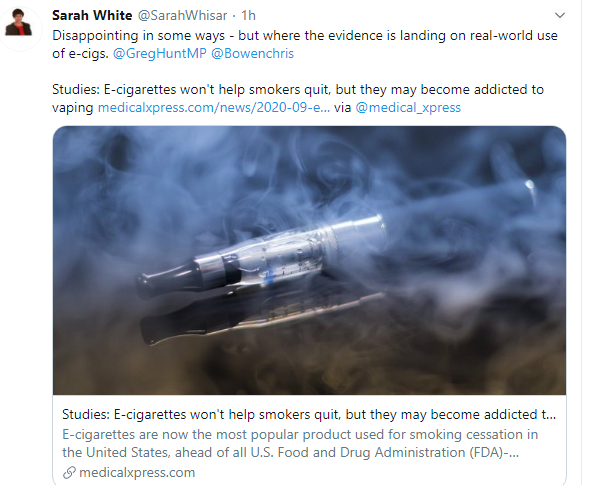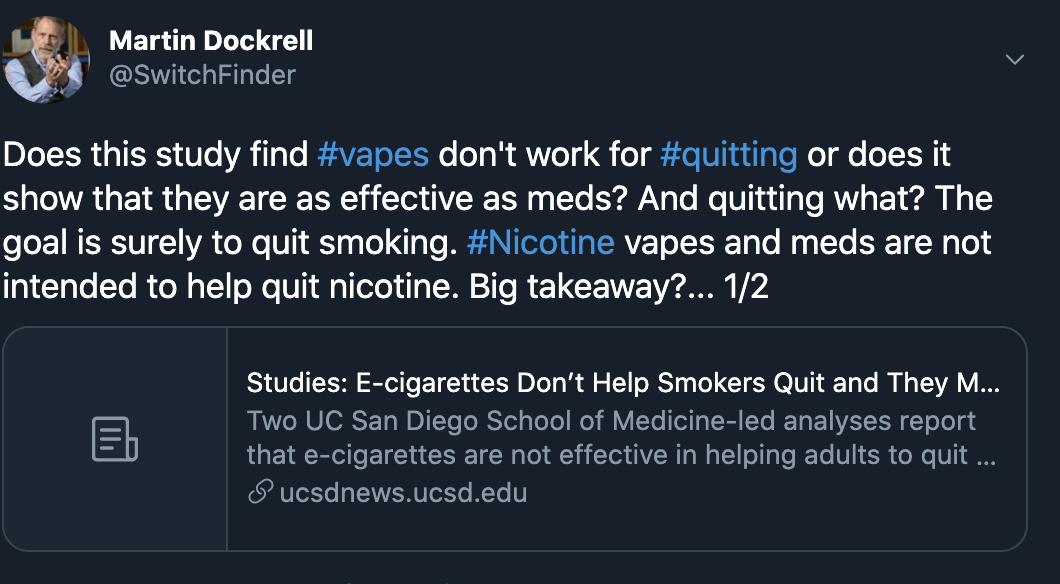The researchers work for a mass of institutions: UC San Diego, New York University, the Food and Drug Administration, the National Institutes of Health, Rutgers Center for Tobacco Studies, the Centre for Addiction and Mental Health, Roswell Park Comprehensive Cancer Center, University of Waterloo, Ontario Institute for Cancer Research, University of Minnesota, Kelly Government Solutions, and Gillings School of Global Public Health.
“While no e-cigarettes have been approved by the Food and Drug Administration (FDA) for smoking cessation to date, adult smokers may try e-cigarettes more frequently than FDA-approved pharmacotherapy aids,” the paper states in its introduction.

Some may wonder why anybody would be concerned about the public not using failing Big Pharma quit aids.
Numbering among the authors, Michael Cummings “has received payment as a consultant to Pfizer”, Maciej Goniewicz “receives fees for serving on an advisory board from Johnson & Johnson and grant support from Pfizer”, and Wilson Compton “reports long-term stock holdings in Pfizer Incorporated”.
It’s a mystery how this paper came to its conclusion.

Lead author John Pierce commented: “Among this representative sample of U.S. smokers trying to quit, we found no evidence that e-cigarettes were helpful in the quit attempt. This lack of effectiveness was also apparent in the sub-sample who used e-cigarettes on a daily basis for this quit attempt.”
“In these analyses, we carefully matched each smoker who used e-cigarettes as a cessation aid with up to two similar smokers who tried to quit without using e-cigarettes,” added Karen Messer, senior author. “Our results suggest that these smokers would have been just as successful in quitting smoking without the use of e-cigarettes. However, without the use of e-cigarettes they would have been more successful in breaking their nicotine dependence.”
The team produced a second paper showing that vaping produced the same results as traditional NRT products. “When you look in the population, there’s no benefit to using e-cigarettes to quit, and there is a potential problem with keeping people dependent on nicotine,” added Pierce.
University College London’s Jamie Brown admitted that vaping is worse than not vaping, “but it’s also going to be a lot better for them than if they’d smoked cigarettes.”
Leonie Brose, King’s College London, said: “In these studies, e-cigarettes don’t come out very well, but neither does anything else. It’s not all about nicotine delivery, quitting needs to be better supported. Without support, none of those options are very effective.”
Related:
- “Role of e-cigarettes and pharmacotherapy during attempts to quit cigarette smoking: The PATH Study 2013-16”, Pierce et al. – [link]
- “E-Cigarette Use to Aid Long-Term Smoking Cessation in the US: Prospective Evidence from the PATH Cohort Study”, Messer et al. – [link]
Photo Credit:
Image by Gerd Altmann from Pixabay
Dave Cross
Journalist at POTVDave is a freelance writer; with articles on music, motorbikes, football, pop-science, vaping and tobacco harm reduction in Sounds, Melody Maker, UBG, AWoL, Bike, When Saturday Comes, Vape News Magazine, and syndicated across the Johnston Press group. He was published in an anthology of “Greatest Football Writing”, but still believes this was a mistake. Dave contributes sketches to comedy shows and used to co-host a radio sketch show. He’s worked with numerous start-ups to develop content for their websites.
Join the discussion
Harm Reduction For The Rich
The United Kingdom risks becoming a harm reduction country only for the wealthy, according to Michael Landl of the World Vapers’ Alliance
CAPHRA Highlights Tobacco Control Flaws
The Coalition of Asia Pacific Tobacco Harm Reduction Advocates highlights the flaws in tobacco control which has led to the rise of black market in Australia
A Missed Opportunity at COP10
The Smoke Free Sweden movement says that COP10 was a missed opportunity to save millions of lives
COP10: Promote Tobacco Harm Reduction
Experts with Smoke Free Sweden are emphasising the urgent need for a Tobacco Harm Reduction approach at COP10












